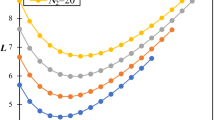Abstract
Multi-class multi-server queueing problems are a generalisation of the well-known M/M/k queue to arrival processes with clients of N types that require exponentially distributed service with different average service times. In this paper, we give a procedure to construct exact solutions of the stationary state equations using the special structure of these equations. Essential in this procedure is the reduction of a part of the problem to a backward second order difference equation with constant coefficients. It follows that the exact solution can be found by eigenmode decomposition. In general eigenmodes do not have a simple product structure as one might expect intuitively. Further, using the exact solution, all kinds of interesting performance measures can be computed and compared with heuristic approximations (insofar available in the literature). We provide some new approximations based on special multiplicative eigenmodes, including the dominant mode in the heavy traffic limit. We illustrate our methods with numerical results. It turns out that our approximation method is better for higher moments than some other approximations known in the literature. Moreover, we demonstrate that our theory is useful to applications where correlation between items plays a role, such as spare parts management.
Similar content being viewed by others
References
D. Bertsimas and G. Mourtzinou, Multiclass queueing systems in heavy traffic: An asymptotic approach based on distributional and conservation laws, Oper. Res. 45(3) (1997) 470–487.
M. Bramson, State space collapse with application to heavy traffic limits for multiclass queueing networks, Queueing Systems 30 (1998) 89–148.
J.A. Buzacott and J.G. Shanthikumar, Stochastic Models of Manufacturing Systems (Prentice-Hall, Englewood Cliffs, NJ, 1993).
J.W. Cohen, On the M/G/2 queueing model, Stochastic Process. Appl. 12 (1982) 231–248.
J.H.A. de Smit, The queue GI / M / s with customers of different types or the queue GI / H m /s, Adv. in Appl. Probab. 15 (1983) 392–419.
J.H.A. de Smit, A numerical solution for the multi-server queue with hyper-exponential service time, Oper. Res. Lett. 2(5) (1983) 217–224.
A. Diaz and M.C. Fu, Models for multi-echelon repairable item inventory systems with limited repair capacity, European J. Oper. Res. 97 (1997) 480–492.
G.H. Golub and C.F. van Loan, Matrix Computations, 3rd ed. (John Hopkins Univ. Press, Baltimore and London, 1996).
D. Gross and C.M. Harris, Fundamentals of Queueing Theory (Wiley, New York, 1998).
R. W. Hall, Queueing Methods for Services and Manufacturing (Prentice-Hall, Englewood Cliffs, NJ, 1991).
C. Palm, Analysis of the Erlang traffic formulae for busy-signal arrangements, Ericsson Technics 4 (1938) 39–58.
H.T. Papadopolous, C. Heavey and J. Browne, Queueing Theory in Manufacturing Systems Analysis and Design (Chapman & Hall, London, 1993).
Y. Saad, Numerical Methods for Large Eigenvalue problems: Theory and Algorithms (Willey, New York, 1992).
C.C. Sherbrooke, Optimal Inventory Modelling of Systems: Multi-Echelon Techniques (Wiley, New York, 1992).
A. Sleptchenko, M.C. van der Heijden and A. van Harten, Effects of finite repair capacity in multiechelon, multi-indenture service part supply systems, Internat. J. Production Economics 79(3) (2002) 209–230.
A. Sleptchenko, A. van Harten and M.C. van der Heijden, Analyzing multi-class, multi-server queueing systems with preemptive priorities, Working paper, University of Twente, Faculty of Technology and Management, Enschede, The Netherlands (2002) submitted for publication.
W. Whitt, Approximations for the GI/G/c queue, Production Oper. Managm. 2 (1993) 144–161.
R.J. Williams, Diffusion approximations for open class queueing networks: Sufficient conditions involving state space collapse, Queueing Systems 30 (1998) 27–88.
Author information
Authors and Affiliations
Corresponding author
Rights and permissions
About this article
Cite this article
van Harten, A., Sleptchenko, A. On Markovian Multi-Class, Multi-Server Queueing. Queueing Systems 43, 307–328 (2003). https://doi.org/10.1023/A:1023209813523
Issue Date:
DOI: https://doi.org/10.1023/A:1023209813523



